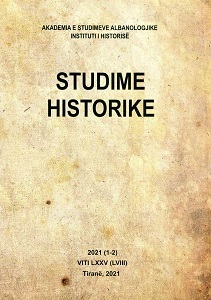NGA TË MANDATUAR NË KOHË LUFTE, NË TË ZGJEDHUR NË PERIUDHË PAQEJE: NJË QASJE KRAHASUESE E TIPAREVE TË PËRFAQËSIMIT NË KUVENDIN KOMBËTAR TË VLORËS DHE PARLAMENTIN E VITIT 1921
FROM WARTIME MANDATED DELEGATES INTO PEACETIME ELECTED MP’S: A COMPARATIVE OVERVIEW OF THE REPRESENTATION FEATURES IN THE VLORA NATIONAL ASSEMBLY AND IN THE PARLIAMENT OF 1921
Author(s): Ledia DushkuSubject(s): Governance, Political history, Social history, Geopolitics, Peace and Conflict Studies
Published by: Qendra e Studimeve Albanologjike
Keywords: Albania; The National Assembly of Vlora; mandates of representation; provincial representation; religious representation; parliamentary elections; Election Law; diaspora; Albanians in Kosovo; Albanian
Summary/Abstract: Article “From wartime mandated delegates into peacetime elected MP’s: A comparative overview of the representation features in the Vlora National Assembly and in the Parliament of 1921” aims to explain and compare as well the features ofrepresentation of the Albanians in two key moments, initially in the National Assembly of Vlora (1912) and then the 1921 elections. It is not by chance that the National Assembly of Vlora was considered as an initial point, because there in Vlora was established the model with two main capillaries upon which the representation of the Albanians should be continued in the future as well. The Parliamentary Elections of 1921 are the first in the history ofthe Albanian, held throughout peacetime, from which emerged a classic type of parliament. The article itself has a parallel-comparative approach, as well as historical and juridical one, between these two key moments throughout the history of the formation of the Albanian state, which makes its novelty too. It reaches the conclusion that the two basic capillaries delineated by the National Assembly, fully national representation, without excluding diaspora, as well as respecting by level of representation the religious ratio of population, were partially implemented during the first parliamentary elections of April 1921. Despite, legal additions of the Law of Elections of December 1920, the whole national representation, including the Albanians in Yugoslavia and Greece, was partially accomplished. In a camouflaged way, Kosovo was represented by MPs from the elections held in the prefecture of Drini, while the province of Çamëria remained unrepresented. Due to international circumstances, the attitude of the Great Powers, fragility of the Albanian state and tense relations with territorial neighbours, the Albanian elite considered right the focus of the level of representation mainly in the territories of the Albanian state, recognized by the Conference of Ambassadors in London (1913). It differently happened with the representation of the diaspora, whose voice was conveyed to the National Council, through Fan Noli, elected by the Albanian Federation "Vatra". The second feature of the level of representation, which was concerned with the respect of the ratios of the religious beliefs of the population, so the equality of religions, was sanctioned in the legal addition made to the Election Law, on December 18, 1921. However, its implementation in the territory favoured the Christian element, especially the Orthodox one, as a reason to avoid foreign propaganda and naming the Albanian state as a Muslim country
Journal: Studime Historike
- Issue Year: 2021
- Issue No: 01-02
- Page Range: 69-89
- Page Count: 21
- Language: Albanian
- Content File-PDF

